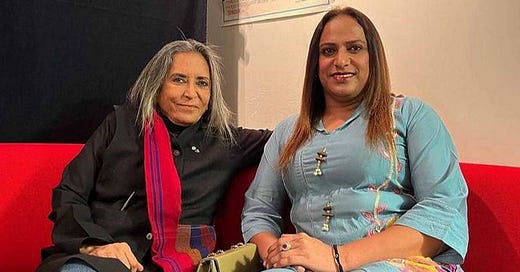BFI London Film Festival 2023: I Am Sirat
I Am Sirat was introduced at the BFI by its titular star, Sirat Taneja, and its director, Deepa Mehta. One of the most touching moments so far of this year’s London Film Festival was hearing Sirat’s drive to make a documentary about her experience as a trans woman in Delhi. She more or less said that her hope was that people would see it and like it, and if they did then her mum might hear about it, and if she did then she might learn to accept her.
With such a beautiful intent behind it, I Am Sirat can’t fail to tell a story that’s worthwhile and with heart. It truly is a collaboration between Sirat and Deepa, with both of them filming segments themselves to make a complete film that’s entirely shot on smartphones. The distinction is a clever one too, with Sirat’s footage coming in a vertical aspect ratio and Deepa’s in a horizontal.
A lot of Sirat’s story is told through her journey of self-discovery by the way of Instagram reels. It lends some meaning to her footage being shot vertically, and we get to see a version of Sirat who never knew she would end up in a documentary about herself. There’s a raw authenticity that comes with it, and that adds so much substance to an already rich film.
The only problem is that so many reels are used throughout. It’s rare that we go from one scene to another without one of Sirat’s reels being inserted almost as a transition. It becomes repetitive, and loses its initial effect. Instead of feeling like we’ve been invited to see a part of Sirat that exists outside of the realms of this film, it starts to feel like we’re being taken away from it. A particular example is when Sirat tells the story of a past relationship and how it all ended in heartbreaking (and transphobic) fashion, we aren’t allowed the space necessary to process the story she’s told us because the film cuts straight into a lip sync video.
Nevertheless, it would take a cold heart not to be impacted by Sirat’s story. Her courage in leading the life that she feels she’s supposed to lead is as inspirational as its effects on her life are devastating. Even the fact that the whole film is shot on smartphones is a small spotlight on just how little we need from a technical point of view to make films nowadays. Those two aspects come together to create the most worthwhile of messages - that we can all be what we should be, as long as we’re willing to work out how.




